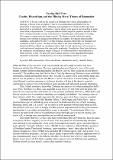Putting hell first : cruelty, historicism, and the missing moral theory of damnation
Abstract
Recent work on the morality of hell spans the various subdisciplines of theology, with the ironic exception of theological ethics. An adequate defence of hell requires a positive account of how God’s eternally tormenting some humans is beautiful, just and worthy of worship. This suggests a short-term and long-term task. The short-term task, which this article pursues, tests whether an adequate moral theory is available by evaluating three possible candidates, the third of which is the most interesting, as it offers a historicist defence of hell: we believe hell is cruel only because of aversions to cruel and unusual punishment that emerged in modernity. Nonetheless, all three defences are inadequate, suggesting a longer term goal: we need either better moral theories or better accounts of hell, as well as greater analytic clarity regarding theological statements of the form, 'I want doctrine y to be true but believe doctrine x is true'.
Citation
Perry , J 2016 , ' Putting hell first : cruelty, historicism, and the missing moral theory of damnation ' , Scottish Journal of Theology , vol. 69 , no. 1 , pp. 1-19 . https://doi.org/10.1017/S0036930615000745
Publication
Scottish Journal of Theology
Status
Peer reviewed
ISSN
0036-9306Type
Journal article
Collections
Items in the St Andrews Research Repository are protected by copyright, with all rights reserved, unless otherwise indicated.

